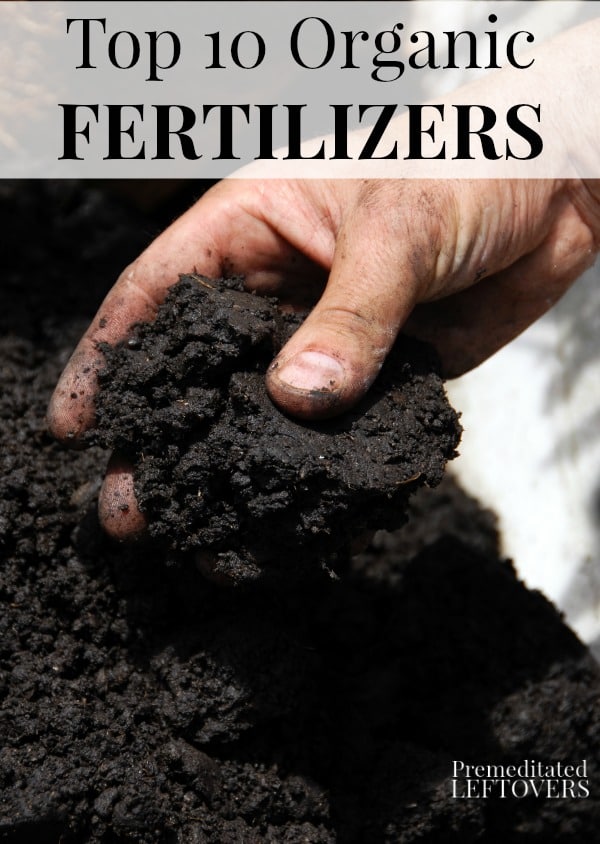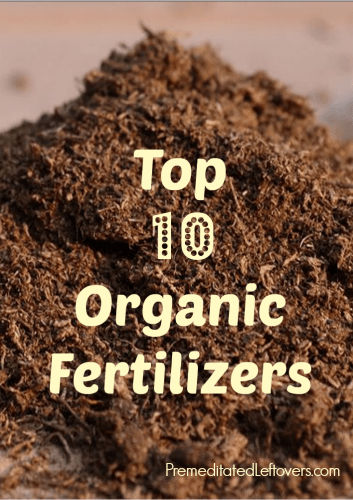Organic fertilizers are a plant’s best friend. Choose from this list of top 10 organic fertilizers to find a fertilizer that meets your plants’ needs.

Does it really matter if you use organic versus synthetic fertilizers? The benefit of using organic fertilizers is that the plant can only uptake the nutrients it can use at the current time and no more. Whereas with synthetic fertilizers, if too much is applied to the plant then it can burn the plant’s roots and leaves and can also kill the plant. Also, synthetic fertilizers make a plant become addicted to the chemicals, much like a drug addict does. The plant wants more and more of the chemicals to thrive, to produce bigger fruits and vegetables. Then those synthetic fertilizers get into our waterways through run offs – it’s a vicious cycle!
How do you know if what you are buying is an organic or synthetic fertilizer? When looking at the bag of fertilizer, you need to read what nutrients are in the package. If it says anything like 10-10-10 or 10-15-10 then you know it is synthetic or chemically made. Natural fertilizers don’t come in perfect combinations of nutrients but show numbers more similar to 4-12-0 or 13-1-0. These three numbers represent the percent by weight of Nitrogen (N), Phosphorus (P) and Potassium (K) and are listed in the same order.
You need to choose an organic fertilizer that’s nutrients match the needs of your plant.
Nitrogen is the primary nutrient used by the plant’s leaves and pretty much everything above the soil.
Phosphorus helps the plant’s roots growth and helps promote flower and fruit production.
Potassium helps the plant build up a tolerance to drought, heat, and cold and is most available in the soil when the pH ranges between 6.0 and 7.0.
Top 10 Organic Fertilizers
Blood Meal: 13-1-0 Blood Meal is a great source for nitrogen and can be mixed in with potting soil and added to the soil of established plants monthly.
Bone Meal: 4-12-0 Bone meal is an awesome source for phosphorus and helps the plant to grow a healthy root system. Works great in conjunction with blood meal.
Compost: 2-1-1 Compost adds organic matter that provides food for beneficial microbial life, which in turn increases the amount of water the soil can hold. Compost also contains many micro-nutrients essential for healthy plant growth. Here is how to start composting.
Earthworm Castings: 2-1-1 Earthworm castings is an overall great organic fertilizer for flower and edible gardens.
Bat Guano: 0-5-0 Bat guano is an excellent source of phosphorus and an essential organic additive for vegetable gardens.
Fish Emulsion: 2-4-5 Fish emulsion has a little bit of everything. This is does not smell all that wonderful – you have been warned! You can get it in a powder or a liquid.
Alfalfa Meal: 2.45-.05-1 Alfalfa meal is a great fertilizer for roses and encourages soil microbial activity, which makes nutrients more readily available to roses.
Cottonseed Meal: 7-2-2 Cottonseed meal has a high percentage of nitrogen, second best source of organic nitrogen after blood meal. Cottonseed meal also acidifies the soil.
Feather meal: 7-0-0 to 12-0-0 Feather meal takes 4 months to break down and release its nutrients, but it is a high nitrogen fertilizer. It is a poultry processing byproduct.
Rock phosphate: 0-2-0 Rock phosphate is a mineral rock powder, rock phosphate is an excellent source of phosphorous and calcium. Remember that the phosphorous contained in rock phosphate becomes more available the second year after application. Be sure to test soil pH before adding rock phosphate.
These are the top 10 organic fertilizers that every gardener should know about, so you can choose the best organic fertilizers to create a healthy organic garden.
Don’t forget to water deeply after you have applied any fertilizer and watch your plants love growing nature intended – with organic fertilizers and amendments!
More Gardening Tips
- How to Start Square Foot Gardening
- How to Make a Frugal Cloche
- Companion Plant Gardening
- Vegetable Container Gardening
- Tips for Attracting Bees to Your Garden
- How to Make Fast and Easy Compost Pile Using Hay Bales
Kristi Trimmer can be found sharing her journey on DragonflyRunning.com.
This post was originally published in February 2014. It was updated on July 21, 2017.


Lester Oestreich says
Can you mix some of these together ?
Fairy Garden Ideas says
What’s up, just wanted to say, I liked this article.
It was practical. Keep on posting!
JP says
This is awfully general advice. Shouldn’t you know first if your soil needs calcium or phosphorus or whatever? Differs if your soil is alkaline or acidic, doesn’t it?
Tessa says
I agree with this too. With rock phos, one application is good. It lasts for a while in the soil. If you’re pH is off though these won’t be available to plants, so start with ph. Because they’re slow release it’s probably okay or at least better than synthetic ferts, however. There was no info on how much to add either.
Tessa says
Correction- there is ph reference.
Rhonda Crank says
Great article. Organic fertilizers can be confusing for many people. You did a good job writing a clear, helpful article.
buddy jackstraw says
Don’t forget kelp meal. Paired with alfalfa is a great combo.
Tessa says
I second that!
Christine says
Where do you purchase these?
Tunie says
Is cottonseed meal organic? Isn’t cotton one of the most heavily sprayed crops? Have always been curious about it as a fertilizer.
Alea Milham says
It can be organic, there are cotton growers that produce organic cotton. You have to read the packaging carefully.